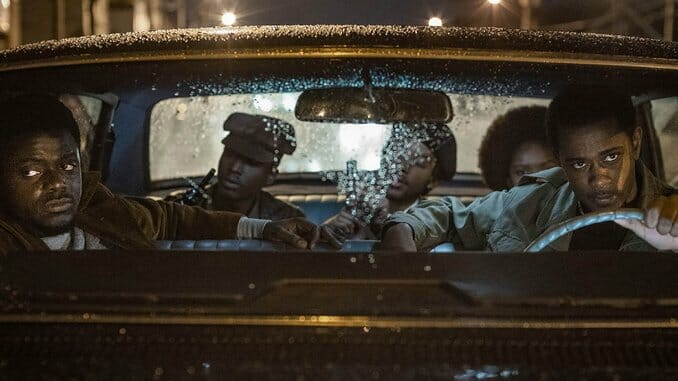Judas and the Black Messiah‘s Bold and Brilliant Storytelling Gives Power to Its People

“Not all skinfolks are kinfolks” is an idiom used colloquially among Black people to address the fact that although they share a racial identity and corresponding experiences of racism, intracommunal ideas regarding the path to Black liberation are seldom synchronous. Furthermore, white supremacy’s propagation of capitalist individualism as the default social framework positions Black collective action as an inherent threat to the United States of America. Director Shaka King centers all these tensions in his brilliant film Judas and the Black Messiah, a historical drama tinged with dazzling shades of caramel and crimson that documents the FBI’s calculated assassination of noted Black Panther Fred Hampton (Daniel Kaluuya).
When car thief Bill O’Neal (LaKeith Stanfield) is caught impersonating a federal officer, FBI agent Roy Mitchell (Jesse Plemons) offers him an ultimatum: If O’Neal helps the Feds infiltrate the Black Panther Party and offers intel on their tactics, he can evade a substantial prison sentence and be handsomely compensated for his cooperation. As O’Neal immerses himself into the world of the Black Panthers, his commitment to his own self-interest is pressured by the Panthers’ communitarianism and radical politics. Judas and the Black Messiah superbly centralizes the betrayal of the informant’s Judas figure as he operates as a nexus between the Panthers and J. Edgar Hoover (Martin Sheen)’s FBI, while also amplifying the experiences of the messianic Hampton and his fellow prominent Panthers portrayed by the film’s impressive ensemble cast.
While I would love to see Kaluuya take on a leading role in which he at no point has to fight for his life (Get Out, Widows, Black Panther, Queen & Slim) he is an exemplary Fred Hampton. EX-EM-PLA-RY. From the head tilt to the Chicagoan cadence to the emotive gaze, Kaluuya manages to embody Hampton’s physicality and voice without falling into the trap of pure mimicry or impressionism. This is no small achievement especially considering the dearth of Hampton’s fictionalized portrayals. On the other side of things, Stanfield sinks into O’Neal’s paranoia and shivering soul in a way that simultaneously prompts reasonable disgust towards the character and intermittent bouts of empathy.
In the film’s opening scene, O’Neal dashes to his car after a failed attempt to prey upon and steal the car of a fellow Black man. A group of unswindled Black men then leap atop O’Neal’s car, with one even cutting through the vinyl roof in an impressively shot sequence. This is a delectable scene that dabbles in both characterization and the film’s larger themes. These men do not merely cut into O’Neal’s car, they chip away at the facade O’Neal embraces—one in which his adjacency to state power helps him gain access to material wealth, makes him impervious to the law and cuts the social ties that tether him to his own Blackness. When surrounded by the men he’s deceived, O’Neal is terrified. The terror seems to come from an immediate fear that he will be attacked, but also from an underlying suspicion that his donning of the state’s cape and mask will paradoxically never result in his own salvation. Stanfield communicates the degrees of O’Neals fear in new and more striking ways as the film progresses: Fear that he will be imprisoned, fear that he’ll be outed as a rat, fear that America will never see nor truly save him.
Judas and the Black Messiah positions O’Neal as the connective tissue between Black radicalism and the white supremacist establishment. More so, as he is integrated into the Panther Party, O’Neal’s personhood becomes the audience’s entry point into Black quotidian life. This is another success on the film’s part. Rather than wrapping the narrative around a constellation of important dates and events as historic dramas often do, the everyday experiences of the Panthers at the center of the story are the film’s North Star. Judas and the Black Messiah naturally covers Hampton’s prison time and infamous murder. But it also leans heavily into his lush social life, laughter with friends in cars and successful efforts to unite oppressed people across Chicago’s deeply segregated ‘60’s social landscape.
-

-

-

-

-

-

-

-

-

-

-

-

-

-

-

-

-

-

-

-

-

-

-

-

-

-

-

-

-

-

-

-

-

-

-

-

-

-

-

-








































